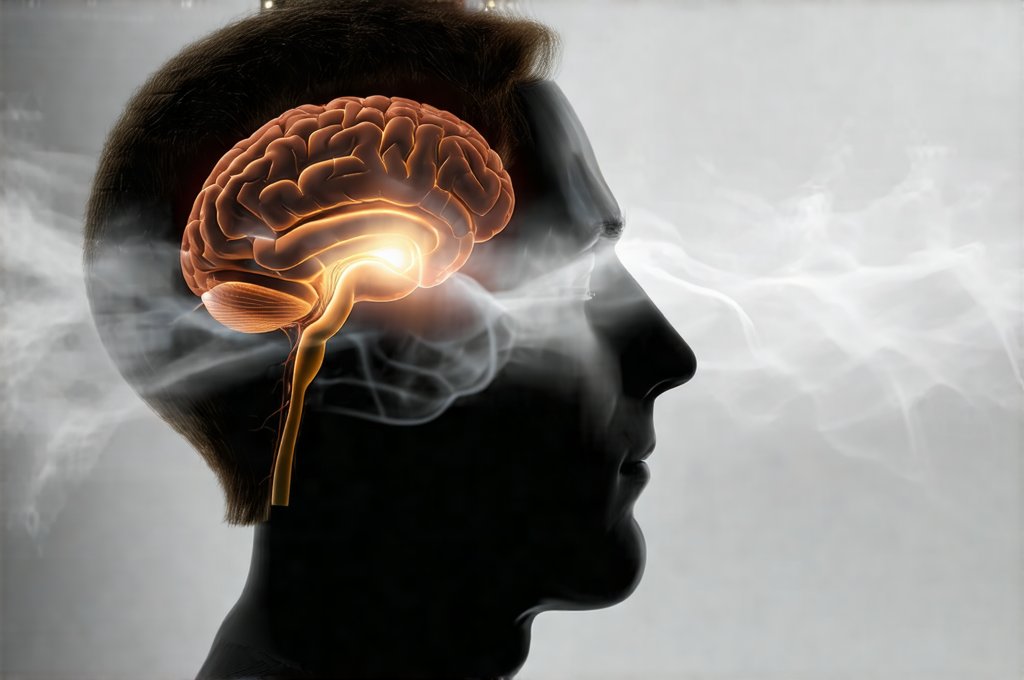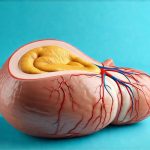Gastroesophageal reflux disease (GERD), often experienced as frequent heartburn, is commonly understood as a digestive issue. However, its impact extends far beyond uncomfortable burning sensations in the chest. Increasingly, individuals with GERD are reporting significant cognitive difficulties – a phenomenon described as ‘mental fog’ or ‘brain fog’. This isn’t simply a matter of feeling tired after a particularly spicy meal; it represents a genuine disruption to mental clarity and function that can profoundly affect daily life, work performance, and overall well-being. The connection between the digestive system and the brain is far more intricate than previously appreciated, with ongoing research revealing bidirectional communication pathways influencing both physical and cognitive health.
The rising awareness of this link necessitates a deeper understanding of how GERD symptoms – and perhaps even the underlying inflammation associated with it – can contribute to these cognitive side effects. While not everyone experiencing GERD will encounter mental fog, its prevalence among those who do suggests a strong correlation that deserves exploration. This article aims to delve into the complexities of GERD-related cognitive impairment, examining potential mechanisms, common symptoms, and strategies for managing this often overlooked aspect of the condition. It’s crucial to remember that this information is for educational purposes and should not substitute professional medical advice; consulting with a healthcare provider is essential for accurate diagnosis and personalized treatment plans.
The Gut-Brain Connection and GERD
The intricate relationship between the gut and the brain, often referred to as the “gut-brain axis,” forms the foundation for understanding how digestive issues like GERD can impact cognitive function. This isn’t a metaphorical connection; it’s a well-documented physiological network involving direct neural pathways – primarily through the vagus nerve – hormonal signaling, and immune system interactions. The gut microbiome, the trillions of bacteria residing in our digestive tract, also plays a significant role in this communication. A disrupted gut microbiome, which can be exacerbated by chronic inflammation associated with GERD, can release substances that influence brain function.
GERD itself, characterized by frequent acid reflux, causes ongoing irritation and potential inflammation within the esophagus and even higher up into the respiratory system. This persistent inflammation isn’t localized; it triggers systemic immune responses. These responses, while attempting to repair damage, also generate inflammatory molecules called cytokines. Cytokines can cross the blood-brain barrier – a protective membrane surrounding the brain – and directly impact neuronal function, leading to cognitive impairment. Essentially, the body’s attempt to deal with GERD-related inflammation inadvertently affects brain health.
Furthermore, nutrient absorption can be compromised in individuals with chronic GERD due to factors like reduced stomach acid production or impaired intestinal lining. Deficiencies in essential nutrients like vitamin B12, iron, and magnesium are known to contribute to cognitive difficulties. The cycle is often self-perpetuating: GERD leads to inflammation and potential nutrient malabsorption, which then worsens cognitive function, potentially exacerbating stress and anxiety – factors that can further aggravate GERD symptoms. It’s a complex interplay where each component influences the others. Understanding the safety and side effects of probiotics may offer some support in this area.
Cognitive Manifestations of GERD
The mental fog associated with GERD isn’t uniform; it manifests in diverse ways depending on individual sensitivities and the severity of the condition. Common cognitive complaints include difficulty concentrating, problems with memory (both short-term and long-term), reduced attention span, slowed thinking, and a general feeling of ‘mental fatigue’. Some individuals describe a sense of being “mentally cloudy” or having trouble finding the right words – a phenomenon often called cognitive disfluency. These symptoms can significantly interfere with daily tasks like work, studying, driving, or even engaging in conversations.
The impact on executive functions – higher-level cognitive processes such as planning, organization, and decision-making – is particularly noticeable. Individuals might struggle to prioritize tasks, manage their time effectively, or make sound judgments. This can lead to increased stress, frustration, and feelings of inadequacy. The insidious nature of these symptoms often leads to misdiagnosis or dismissal, with individuals attributing their cognitive difficulties to stress, lack of sleep, or simply ‘getting older’. It’s vital to recognize that these cognitive changes could be directly linked to GERD and should be investigated as such. Exploring the link between gut pain and emotional triggers can help understand how this cycle impacts mental well-being.
Beyond the core cognitive symptoms, there’s a strong overlap between GERD-related mental fog and other conditions like anxiety and depression. Chronic discomfort from GERD can contribute to mood disorders, while the cognitive impairment itself can exacerbate feelings of helplessness and hopelessness, creating a vicious cycle. This makes it essential to address both the physical and psychological aspects of GERD for comprehensive management.
Identifying Contributing Factors
Pinpointing the precise cause of mental fog in individuals with GERD requires careful evaluation as multiple factors often contribute.
- First, the frequency and severity of reflux episodes are critical. More frequent and intense acid exposure is likely to result in greater inflammation and cognitive impact.
- Second, identifying trigger foods – those that exacerbate GERD symptoms – can significantly reduce both digestive discomfort and associated mental fog. Common triggers include caffeine, alcohol, spicy foods, fatty foods, chocolate, and citrus fruits. Keeping a food diary can be immensely helpful in this process.
- Third, consider coexisting conditions such as sleep apnea or anxiety disorders, which can independently contribute to cognitive impairment and may worsen GERD symptoms. It is important to understand the connection between GERD and Sleep Apnea: Exploring the Connection.
A holistic approach that considers the individual’s lifestyle, diet, stress levels, and overall health is essential for accurate identification of contributing factors. Often, a combination of strategies – dietary modifications, stress management techniques, and appropriate medical interventions – is necessary to achieve meaningful improvement. It’s important not to self-diagnose; seeking professional evaluation is key.
Managing GERD Symptoms & Cognitive Function
Effective management of GERD symptoms is the cornerstone of addressing associated mental fog. This typically involves a multi-pronged approach:
- Lifestyle Modifications: These include elevating the head of your bed, avoiding late-night meals, losing weight if overweight or obese, and quitting smoking.
- Dietary Changes: Eliminating trigger foods and adopting a GERD-friendly diet can dramatically reduce reflux episodes.
- Medications: Over-the-counter antacids can provide temporary relief, while proton pump inhibitors (PPIs) and H2 receptor antagonists require a prescription and offer more sustained acid suppression. It’s crucial to discuss medication options with your doctor, as long-term use of some medications may have side effects.
Beyond addressing the physical symptoms, incorporating strategies to support cognitive function can be beneficial:
– Regular exercise promotes blood flow to the brain.
– Adequate sleep is essential for cognitive restoration.
– Mindfulness and meditation can reduce stress and improve focus.
– Engaging in mentally stimulating activities – such as puzzles, reading, or learning a new skill – helps maintain cognitive reserve. Understanding potential gut side effects from supplements used during this time is important.
The Role of Inflammation & Future Research
The growing understanding of inflammation’s role in GERD-related mental fog is opening up new avenues for research and potential interventions. While current treatments primarily focus on acid suppression, there’s increasing interest in therapies aimed at reducing inflammation both systemically and within the brain.
- Dietary strategies that emphasize anti-inflammatory foods – such as fruits, vegetables, whole grains, and omega-3 fatty acids – may offer additional benefits.
- Probiotics, which support a healthy gut microbiome, are being investigated for their potential to modulate immune responses and reduce inflammation.
- Researchers are also exploring the use of specific nutrients and supplements that have anti-inflammatory properties and could potentially improve cognitive function in individuals with GERD. This is especially relevant when considering pancreas and gut health: exploring the connection.
Further research is needed to fully elucidate the complex mechanisms underlying this connection and to develop targeted interventions. However, recognizing the link between GERD and cognitive impairment is a crucial step towards providing more comprehensive and effective care for individuals suffering from this often debilitating condition. It’s no longer enough to simply address the heartburn; we must also acknowledge and address the impact on mental clarity and overall well-being. The potential long-term effects of treatments, such as those used in GI cancer treatments, can further complicate cognitive function. Additionally, managing long-term side effects of cancer treatment often involves addressing gut health and its impact on cognition.


















